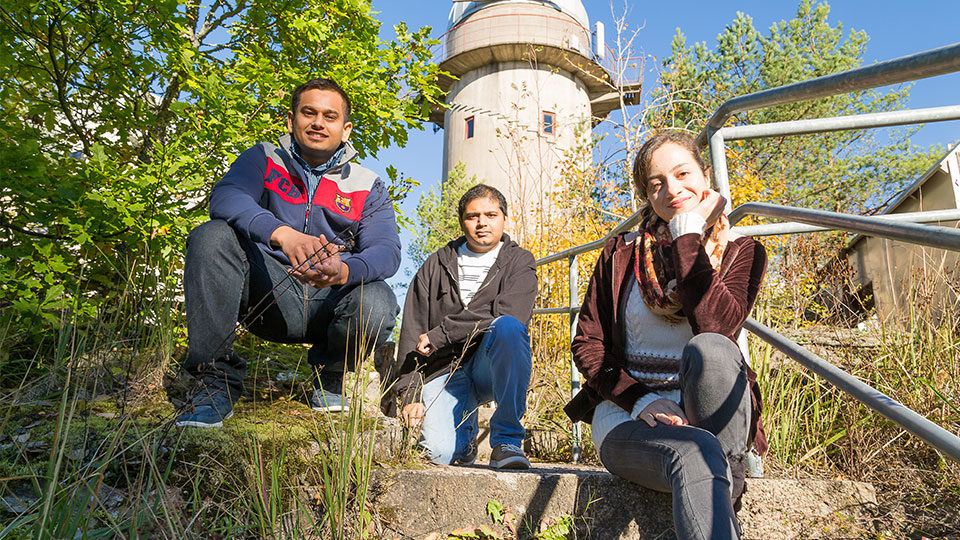Master's Degree Programme in Exact Sciences: Astronomy and Space Physics
The Astronomy and Space Physics specialisation track encompasses a broad range of topics from the physics of the Sun and solar system to astrophysics of black holes and neutron stars and various astrophysical transients, as well as topics in galactic structure and evolution, and cosmology.
Meet programme staff at Virtual Open Week on 20 Nov at 14.30!
The Astronomy and Space Physics track includes a solid grounding in theoretical aspects as well as providing opportunities for observational studies, e.g. of supernovae or accreting black holes. The space physics group performs experimental, theoretical, and computational research on high-energy phenomena in near-Earth space.
Upon graduation, you will be able to use the diverse set of skills acquired as part of this track, including computational and numerical techniques.
The Astronomy and Space Physics track is one of six specialisation tracks of the Master's Degree Programme in Exact Sciences (previously called the Master's Degree Programme in Physical and Chemical Sciences). The other tracks of the programme are
- Chemistry of Drug Development
- Chemistry of Materials for Sustainable Development
- Materials Physics
- Mathematics and Statistics
- Theoretical Physics.

Entry requirements
General Requirement
You are an eligible applicant for Master’s-level studies if
- you have a nationally recognized first cycle degree – normally a Bachelor’s degree – from an accredited institution of higher education,
- your degree corresponds to at least 180 ECTS (European credits) or three years of full-time study,
- your degree is in a relevant field for the Master’s degree programme that you’re applying to. Please check the section on track-specific admission requirements for detailed degree requirements.
Language Requirements
Applicants must have excellent English language skills and a certificate that proves those skills. You can indicate your language skills by taking one of the internationally recognized English language tests.
Applicants must reach the minimum required test results to be eligible for the University of Turku. No exceptions will be made. Read more about the language requirements here.
Study right
It is not possible to have more than one Bachelor’s or Master’s study right at the same Faculty. Therefore, when accepting an offered study place, the student will lose any previous BSc. or MSc. study right at the Faculty of Science at the University of Turku.
Before you start preparing your application, always read the full admission requirements on the application portal Studyinfo.fi
The applicant’s previous degree, based on which s/he is seeking admission to the Master’s Degree Programme in Exact Sciences, must be in a relevant field of study. Relevant fields of previous studies for the Astronomy and Space Physics track are
- astronomy
- physics
- or similar
You may not apply to more than one specialization track within the same Master’s Degree Programme at the University of Turku. Therefore, you should carefully consider the suitability of your educational background for the applied track.
The decision of admission will be based on
- the relevance of the applicant’s awarded degree(s)
- the amount, relevance, and grades of the courses in the degree(s)
- the language test result (see Language requirements)
- the motivation letter (see full entry requirements for the obligatory motivation letter template)
- relevant track-specific methodological knowledge
- possible interview
The academic evaluation is made only for complete applications received during the application period. Any preliminary assessment of suitability or chances for admission will not be given.
Programme in brief
The structure of the programme is modular and each specialisation track has three obligatory modules that contain the core material of the field. These include the MSc thesis (30 ECTS), lecture and exercise courses, seminars, laboratory work, internship, or project work, details of which depend on the specialisation. In addition, there is a thematic module that may be chosen to support your study plan. The fourth module consists of freely chosen courses and obligatory Finnish language and culture courses (5 ECTS).
In the Astronomy and Space Physics Track, there is one obligatory module of theoretical courses, one obligatory module of methodological courses, and one obligatory module containing the Master’s Thesis (30 ECTS), and special courses like seminars and projects in research.
Theoretical courses will cover aspects of plasma physics and astrophysics, radiative processes, hydrodynamics, spectroscopic diagnostics in astrophysics, nuclear and particle physics, as well as stellar structure and evolution.
The methodology module covers observational techniques, data analysis methods, and numerical methods. Here, you will take courses in the methods of observational astrophysics, optics, statistical and simulation methods, signal and image processing, time-series analysis and Fourier transforms.
You are free to choose the thematic module from those offered in the faculty or take a suitable minor subject, even one offered by other faculties such as computer science, mathematics, chemistry, business creation, and innovation. Thematic modules offered by this programme include Special Courses in Space Sciences and Instrumentation for Space Sciences.
The Special Courses in Space Sciences will give you a deeper understanding of e.g. high energy astrophysics, physics of planet formation, galaxies and cosmology, galactic astronomy, and heliophysics. Here you can select the topics that support your Master‘s thesis. The Instrumentation for Space Sciences module allows to get deep knowledge of the design of optical and space instruments. The students can also choose the Data-analytics and Physical modelling modules which will improve their understanding of the data analysis techniques and the methods of physical modeling.
In the other studies module, you can choose any courses you want from the entire offering of the university in addition to the obligatory “Finnish for foreigners” courses. It is recommended that you take more courses on computing, modeling, and theoretical physics, depending on your preferences.
The University of Turku fosters students' professional growth and global perspective by promoting internships and student exchanges. Every degree student can take advantage of these opportunities – an internship subsidy is available for all degree students that find a suitable internship position and every exchange programme includes a grant.
Does this page answer your questions about the programme's content and academic matters? If not, contact infoscitech@utu.fi.
The aim of the Master’s education is to support you to become an independent expert who can evaluate information critically, plan and execute research projects to find new knowledge, and to solve scientific and technological problems independently and as part of a group.
The Master’s degree programme includes a compulsory thesis component (30 ECTS), which corresponds to six months of full time work. The thesis is to be written up as a report based on a combination of a literature review and an original research project that forms the bulk of the thesis.
The thesis is an independently made research project but the project will be carried out under the guidance of leading researchers in the field at the University of Turku. It is expected that the student will be embedded within an active research group or experimental team, thereby providing excellent opportunities to discuss results and exchange ideas in a group setting.
Recent examples of thesis titles in astronomy and space physics are:
- Flux decay during thermonuclear X-ray bursts: decay rate analysis using dynamic power-law index method
- Mass and radius constraints for neutron stars from pulse shape modeling
- Near-infrared observations of supernovae with the Nordic Optical Telescope
- The population of supernovae and their progenitors in starburst galaxies
- Photometric studies of exoplanet transits of stars in the open cluster M44
- Polarimetric studies of binary stars: the case of HD 4809
- Variability of optical polarization and gamma-ray flux in blazar jets
- Linear polarization of BL Lacertae OJ 287 at 21 cm
- Very high energy gamma-rays emitting BL Lac’s population study
- Statistical study of velocity dispersion analysis of Solar particle eruptions
- Design, construction and testing of the prototype of a simple particle instrument for a space flight
- Modeling solar energetic particle fluences using observations from ground level events
- Calibration and simulations of SIXS-P response to energetic particles
- Transport of energetic charged particles in reservoirs behind CME-driven shock waves
- Instruments for observing energetic neutral atoms in space
The Master’s Degree Programme in Exact Sciences has six tracks. A short description of this specialisation track is given below. You can find more detailed information on tracks from the specific site of each track by clicking on the links below.
Students specialising in Astronomy and Space Physics can choose among three lines of studies: theoretical astrophysics, observational astronomy, and space physics. You will acquire knowledge of various astrophysical phenomena and plasma physics, from the Solar system to neutron stars and onto galaxies and cosmology. You will also get hands-on experience with observational techniques, space instrumentation, numerical methods, and analysis of large data sets.
Other tracks:
Chemistry of Drug Development, Chemistry of Materials for Sustainable Development, Mathematics and Statistics, Materials Physics, and Theoretical Physics.
Career prospects
The Master of Science degree provides the skills to work in many different kinds of positions within areas such as research and development, education and management, and industry. The specialisations of Astronomy and Space Physics provide very good data analysis and programming skills, and thus many graduates have gone on to successful careers in the big data and finance sectors
During the master’s program in astronomy and space physics, you will study plasma physics and hydrodynamics, radiative processes, high-energy astrophysics and solar physics, galaxies and cosmology, astrophysical spectroscopy, radio astronomy and X-ray and gamma-ray astronomy, numerical techniques and programming, statistical methods and particle and photons detectors. You will carry out hands-on exercises in observational techniques, space instrumentation, and analysis of large data sets. You will also be able to remotely use modern observational facilities and to participate in building space-qualified instruments.
You may choose among three lines: space physics, observational astrophysics and theoretical astrophysics. These studies will prepare you for a career in research and development in industry or can often lead into PhD studies.
The prospects for employment at relatively senior levels is excellent for those trained in the physical and chemical sciences. Thanks to the broad scope of the programme, the skills and knowledge developed as part of this education at the University of Turku provide many employment opportunities in different areas.
Many of our graduates choose to continue their education by pursuing PhD studies in Finland or other European countries (e.g., Belgium, Estonia, Germany and Norway). Others have obtained employment in the software and high-tech industries, for example.
The Master’s Degree provides eligibility for scientific postgraduate degree studies. Postgraduate degrees are doctoral and licentiate degrees. The University of Turku Graduate School – UTUGS has a Doctoral Programme in Exact Sciences, and covers all of the disciplines of this Master's Degree programme. Postgraduate degrees can be completed at the University of Turku.
Note that in Finland doctoral studies incur no tuition fees, and Ph.D. students often receive either a salary or a grant to cover their living expenses. The Master’s programme is a stepping stone for Ph.D. studies.
Podcast: Colours of UniTurku | Warm Purple: Delta
Colours of UniTurku introduces Delta, the student association of mathematics and physical science of the University of Turku. #utuambassador Parisa Piran and a board member of Delta, Aleksi Varho, talk about Delta’s activities and gatherings. Aleksi shares his motives for joining Delta and his best experiences!

